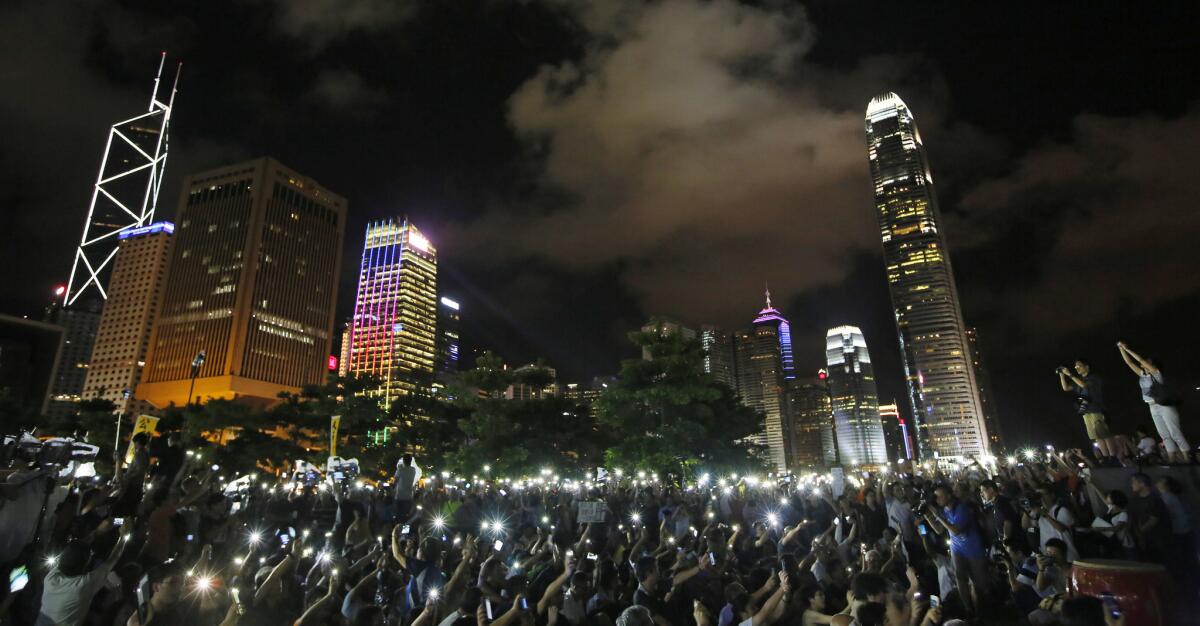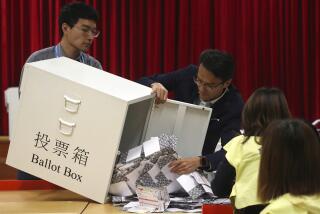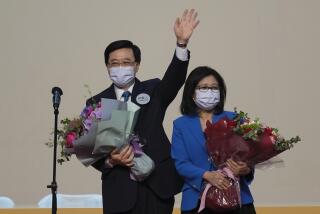China sets limits on 2017 Hong Kong popular vote, dismaying activists

- Share via
Reporting from Beijing — Setting up a showdown with democracy activists, China’s top legislative body said Sunday that Hong Kong residents can vote directly for their next leader in 2017 — but that only two or three candidates will be allowed and all must be approved by special nominating committee.
Tension has been building for months over rules for the 2017 election of a new chief executive of the largely autonomous former British territory, which returned to Chinese sovereignty in 1997 under a framework known as “one country, two systems.” The drama has mounted this summer amid a series of rallies and counter-rallies, petition drives and even an unofficial vote that drew nearly 800,000 participants.
The Basic Law outlining terms of the 1997 handover granted Hong Kong a high degree of autonomy for 50 years, and the region’s 7 million residents enjoy greater freedom of speech, assembly and other rights than their counterparts in the Communist-run mainland.
Until now, the city’s chief executive has been selected by a 1,200-member panel regarded as largely pro-Beijing. But the Basic Law provides for a “universal suffrage” system to be adopted as soon as the 2017 election, and democracy activists have been pushing for balloting that measures up to what they call “international standards” for free and fair election.
Activists say one-person, one-vote will be meaningless if candidates all have to be approved by a nominating committee they see as beholden to Beijing’s interests. Instead, they’ve been pushing for an open nominations system, allowing any candidate with a modicum of public support to join the race. If that doesn’t happen, they have proposed blockading Hong Kong’s central business district to press their demands.
Beijing, however, contends that an open nominations system is counter to the Basic Law. And mainland officials and some Hong Kong business groups have warned that democracy sit-ins would throw the Asian financial hub into chaos and gridlock.
In announcing the elections framework Sunday in Beijing, Li Fei, deputy secretary general of the National People’s Congress’ standing committee, said an open-nominations system would create a “chaotic society.”
“Many Hong Kongers have wasted a lot of time discussing things that are not appropriate,” he told a news conference.
The committee, in announcing its decision, said authorities “must proceed in a prudent and steady manner” because the “long-term prosperity and stability of Hong Kong and the sovereignty, security and development interests of the country are at stake.”
But activists argue that a failure to forcefully push forward with democratic reforms constitutes an even greater threat to the territory’s long-term prosperity and stability, noting that the city’s status as a world financial center is due substantially to its Western-style legal system and liberties. They point to a growing wealth gap, sky-high housing costs and increasing influence from the mainland as eroding their quality of life and say the current chief executive, C.Y. Leung, has been unresponsive to citizens’ needs.
Sunday’s decision by the National People’s Congress’ standing committee had been telegraphed weeks in advance, and thousands of Hong Kong democracy activists rallied Sunday night outside the city government headquarters to build support for the next phase of their campaign.
Benny Tai, a leader of the Occupy Central With Peace and Love movement, told the crowd of several thousand that Sunday marked the beginning of an “era of civil disobedience.”
“It’s pretty bad. I would say it’s a dark day. I think ‘one country, two systems’ is over now,” Ed Chin, who heads a group of financial industry professionals supporting the democracy movement, said by phone from the rally as Tai spoke.
“Beijing has set a very high hurdle to get nominated as a candidate,” added Chin. “That means all pan-democrats or anyone who’s not pro-business would not even be have a chance to even be admitted into the race.”
Though Tai made no specific call to action Sunday, some student groups have floated the idea of campus strikes in response to what they contend would be “fake democracy.” High school and college students have been among some of the most vocal supporters of the campaign.
Hong Kong’s government is now charged with drawing up detailed rules for the election, and the rules must be approved by two-thirds of the territory’s Legislative Council. Several pro-democracy lawmakers have vowed to vote down any proposal that does not meet their criteria, but it’s unclear whether they can muster enough support to block adoption of the rules.
If new rules fail to be approved, the system for selecting the chief executive will continue as is.
On Sunday, Leung, the current chief executive, spoke out against such a possibility, saying at a news conference that a veto would force 5 million eligible Hong Kong voters to “become bystanders” in the next election.
Follow @JulieMakLAT for the latest news from China
More to Read
Sign up for Essential California
The most important California stories and recommendations in your inbox every morning.
You may occasionally receive promotional content from the Los Angeles Times.











